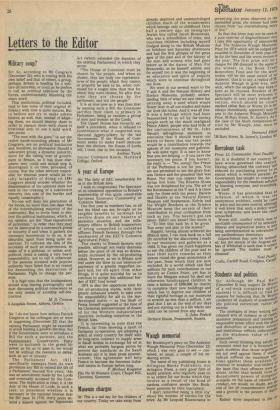Sir: I do not know how serious Patrick Cosgrave or
his colleague are or were in suggesting (December 22) that the existing Parliament might be extended to avoid holding a general election; but if the Government were to introduce a Bill for such a purpose, and the Parliamentary Conservative Party were to succumb to the greed for power so far as to pass it, we would not be without the resource to defeat such an act of tyranny.
The Parliament Act, 1911, specifically exempts from its own provisions any Bill to extend the life of a Parliament beyond five years; this was an amendment made by the Lords and eventually accepted by the Commons. The implication is clear; it is the duty of the House of Lords, in such a case, to determine whether it is necessary in the national interest that the Bill pass. In 1716, thirty peers entered a dissent against the Septennial Act (which extended the duration of the existing Parliament) in which they wrote: "The House of Commons must be chosen by the people, and when so chosen, they are truly the representatives of the people, which they cannot so properly be said to be, when continued for a longer time than that for which they were chosen; for after that time they are chosen by the parliament, and not the people."
It is as true now as it was then that by passing such a Bill the Commons sacrifice their claim to primacy in Parliament, being as random a group of men and women as the Lords.
The Upper House has recently set itself a precedent, when it refused to countenance what it suspected was electoral jiggery-pokery by the last Government. If the House of Commons seeks to make itself immune from the electors, the House of Lords will, I trust, rise to the occasion.
Andrew Turek Junior Common Room, Hertford College, Oxford


































 Previous page
Previous page